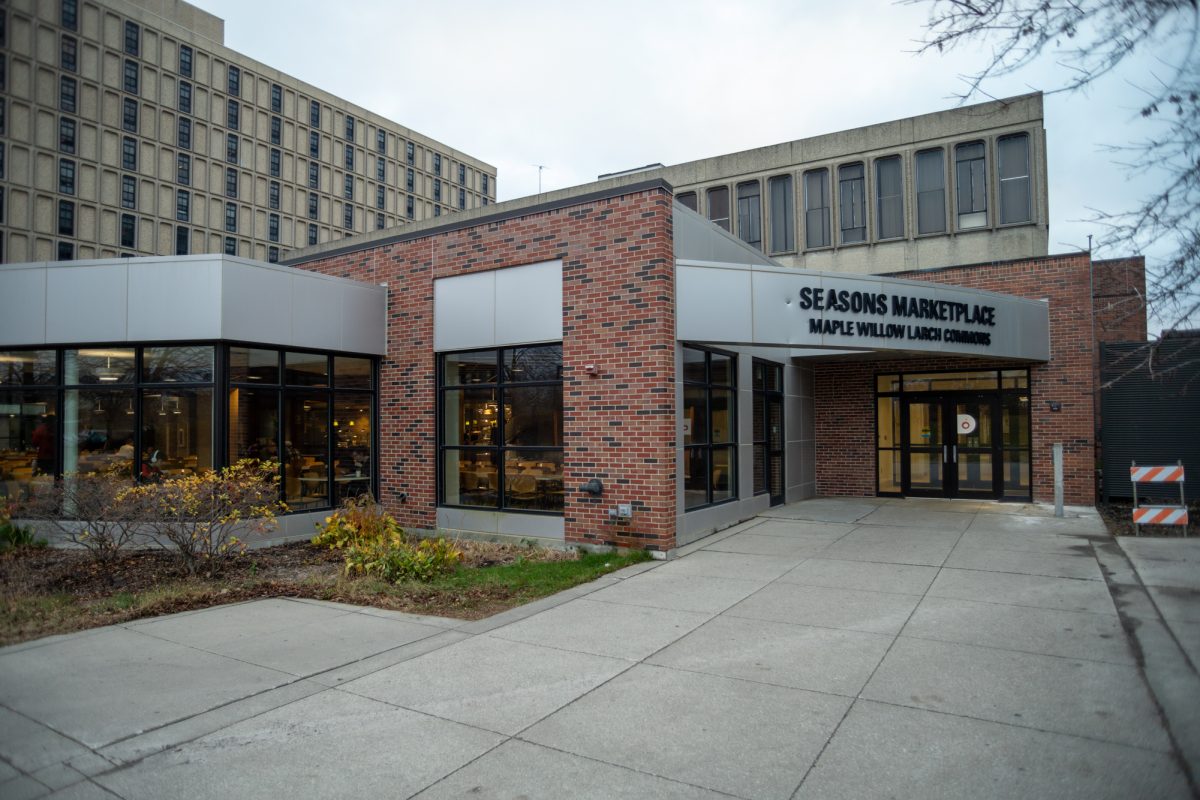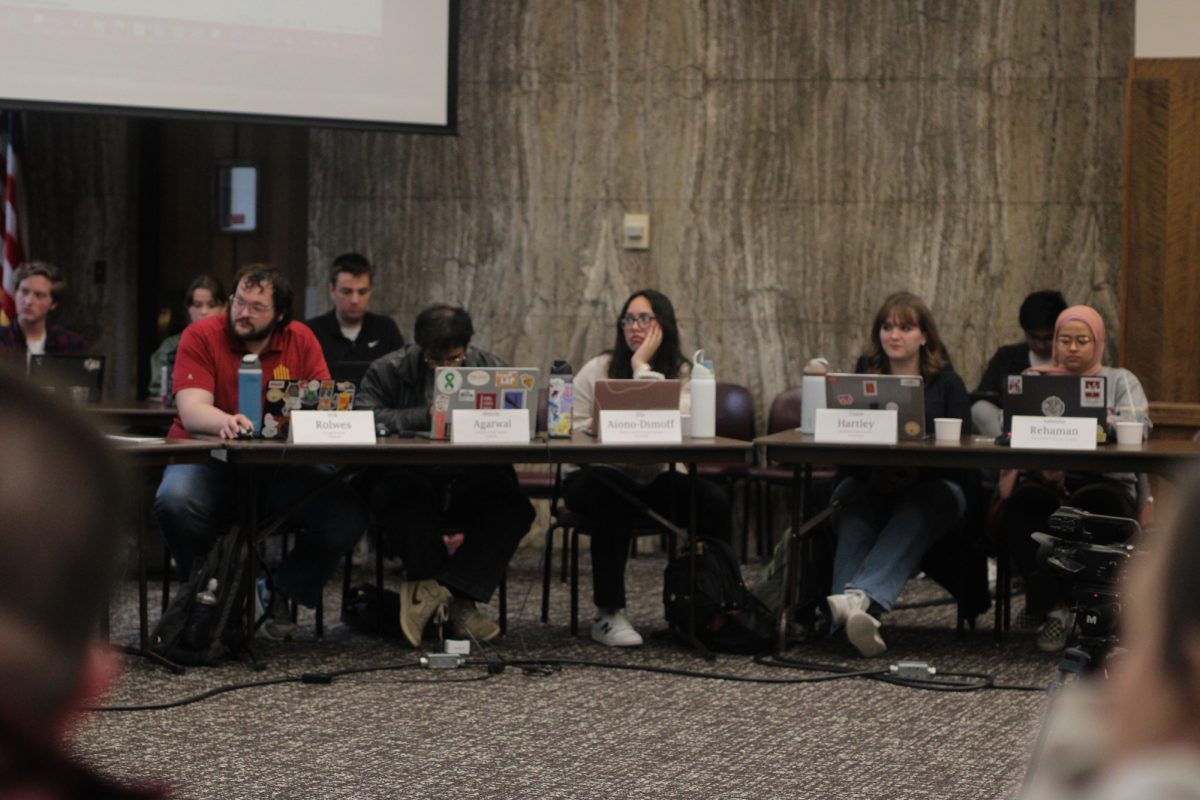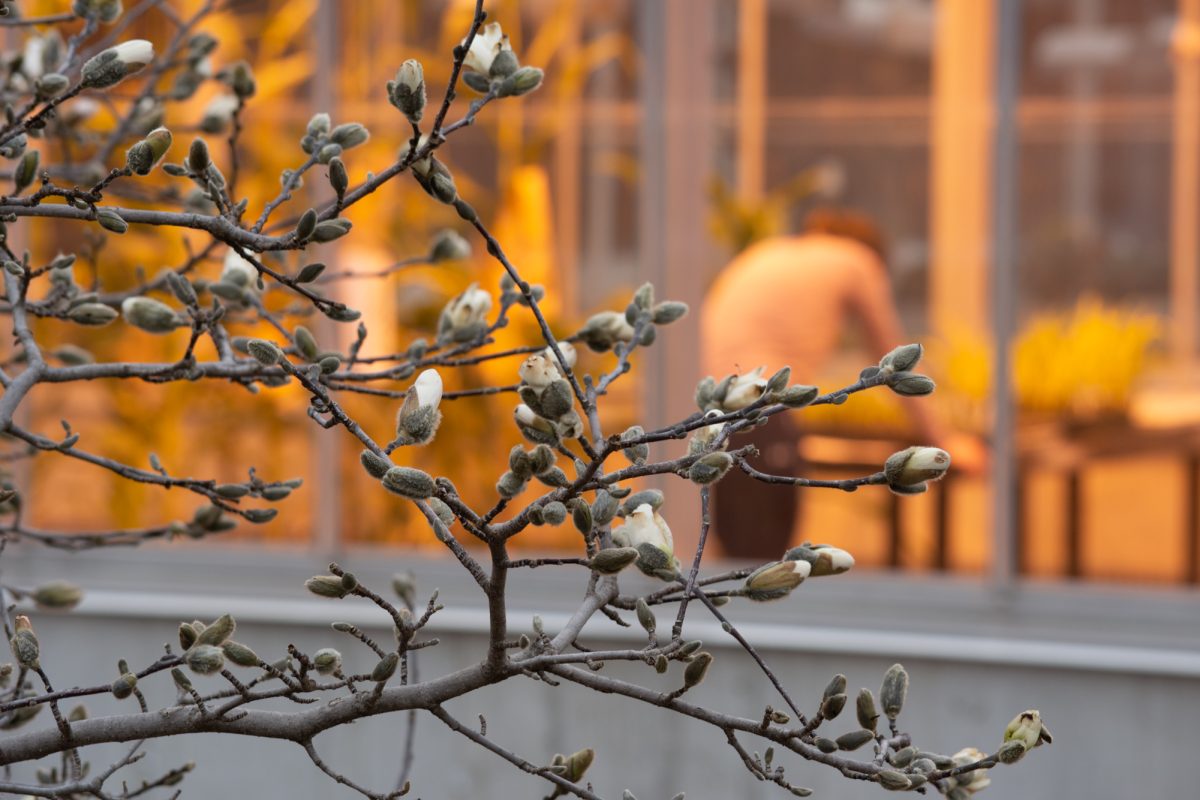Some students have reported sickness, receiving raw or undercooked food and foreign objects in their dining hall food from Seasons, Union Drive Community Center (UDCC) and Conversations this academic year.
“At the salad bar, they have chicken and it’s yellow and it doesn’t look like chicken,” said Seasons’ salad bar Hailey Ferris. “I also know people that have gone to [Conversations] and gotten sick from the raw chicken breast.”
Kate Tomlinson, a freshman studying food science, said she has received raw or undercooked chicken multiple times this year.
“The first time was at UDCC, and they had a grilled chicken sandwich,” Tomlinson said. “I sat down and I took my first bite, and it tasted funky. So I held up my burger and in the middle of it, it was just pink.”
After realizing her burger was undercooked, Tomlinson immediately took her sandwich to the dish line.
“I walked up to the conveyor belt and the amount of chicken sandwiches with one or two bites taken out of it made me think, ‘Okay, maybe it’s not just a me thing,’” Tomlinson said.
Next, Tomlinson alerted one of the staff members working at the time.
“I had gone up to the front, where you scan your card, and I asked if there was someone I could speak with,” Tomlinson said. “When the manager walked over, I explained that I got raw chicken and they asked, ‘Well, did you take a picture of it?’ My first thought was not to take a picture of it, it was to be like, ‘Hey, maybe check your chicken?’”
According to Tomlinson, the manager she talked to said they would look into it, but Tomlinson never heard back. Since Tomlinson is studying food science and has a background in cooking food, she stressed the importance of food safety practices.
“It falls on the biggest person in charge and they are supposed to be making sure everyone is trained,” Tomlinson said. “I don’t know the training that they do, but having the wrong temperature of food can make people insanely sick and could even kill someone.”
Halle Christensen, a freshman in biology, explained that she has a sensitive stomach and relies on her accessibility to safe foods.
“I eat the pasta a lot, but I don’t eat ground meat or beef, and dairy makes my stomach upset, so whenever I go to Seasons and the two pasta sauce options are beef marinara or alfredo, I am like, ah hell nah,” Christensen said.
Christensen said it is frustrating that her safe foods are not always available.
“I feel like I’m stuck and then that stresses me out, because I’m like, ‘What am I going to eat for the day?’” Christensen said. “I only eat at the dining halls, and I have a few snacks in my dorm, but not a meal’s worth.”
Teryn Close, a sophomore in agronomy, said the quality of food at Seasons lags behind other dining halls.
“I learned the hard way at Seasons to not eat the lunch meat because it made me extremely sick,” Close said. “Every time I go to Seasons, I get really sick. The food at Seasons is way lower quality overall.”
To avoid Seasons, Close eats exclusively at UDCC and Windows.
“I live in Maple, so it’s really annoying and out of the way, especially in the winter,” Close said. “You pay so much money for this meal plan, and then the dining hall by you is so terrible that you have a 10-minute walk when it’s windy and cold just to get a meal.”
Kathryn Limas, a freshman in biochemistry, reported finding a pebble in her food earlier in the school year, at UDCC.
“When I felt it in my mouth, I was startled, you know, because you hear all these horror stories of raw food or, ‘Oh, I found this in my food,’ and you don’t really expect it to actually happen, and then it does,” Limas said.
Limas questioned how a rock was ever able to make it into her food in the first place.
“That’s another thing I wondered,” Limas said. “‘How would a rock get in my food?’ How would you be put in a position where a rock, or a little pebble even, would be able to find its way in my food?”
Addie McKain, a freshman in human resource management, said the food she has been served has made her sick.
“Every week they serve this, what’s supposed to be stir fry, but it looks like cat food on top of the rice,” McKain said. “It gives you a stomachache for like six hours after, so I don’t recommend; don’t eat it.”
Limas said that one way ISU dining could recover its reputation is by reflecting on quality and past issues in the dining halls.
“Seasons has had a lot more issues with undercooked food and other issues like that, so looking back and reflecting on those issues, especially if they’ve been brought up to people, would be one way to improve,” Limas said.
Food Safety and Quality Assurance specialist Tori Tafoya said ISU Dining uses a variety of resources to train its staff on proper food handling and food safety practices.
According to Tafoya, ISU Dining uses ServSafe training, Certified Food Protection Manager training, FARECheck training and internal training available to employees through Workday.
“We are watching that process and we are implementing our procedures all the way through,” Tafoya said. “We are monitoring those employees as they work, whether they be part-time employees or full-time employees, so from top to bottom.”
Director of ISU Dining, Karen Rodekamp, said there are a number of protocols ISU Dining uses, beginning even before food arrives on campus and lasting until the end.
“It’s not just our cooks and our managers that are trained,” Rodekamp said. “It’s even the individuals who transport the food or receive the food, like Tori said, it’s from the beginning to end.”
For students who have had an experience they are unhappy with, the biggest advice is to communicate and do so early.
“If you see something, let our team know, because we will put corrective actions into place immediately,” Rodekamp said.
Rodekamp recommends contacting a team member on site but there are also ways to contact ISU Dining via their website, including an intake form, their email and the administrative office phone number.
“But the best is timely communication, ideally, even in the moment so the team can review the product and take steps at that very moment,” Rodekamp said.
Rodekamp explained the process that ISU Dining goes through after being notified.
“We can immediately start going back and looking at our logs, making sure there’s no discrepancies or any kind of problems,” Rodekamp said. “We can talk to the manager and find out if anybody else has reported any kind of situation or problem.”
ISU Dining also has an on-site dietitian that students can consult with.
“We have the resource of an on-site dietitian because students are trying new foods that they are not accustomed to and they may have an underlying allergy that presents itself later,” Rodekamp said. “Because students are being exposed to new cuisines or new spices or preparation methods, working with our dietitian is another resource that we have for students.”
Close said she is grateful for the variety of dining locations offered at Iowa State.
“I’m fortunate that we have a lot of options at ISU because I know a lot of colleges in Wisconsin, which is the state I’m from, don’t have a lot of dining hall options,” Close said.
Meredith Ponder Hanisch, director of communication and marketing for campus life, said ISU Dining has a culture that speaks to the work environment and morale of their team.
“I’m blown away every time anything happens here because everybody wants to help, everybody wants to fix whatever it was, or even if it’s not a problem, just be involved,” Ponder Hanisch said. “People are incredibly passionate on the team, which I love.”














